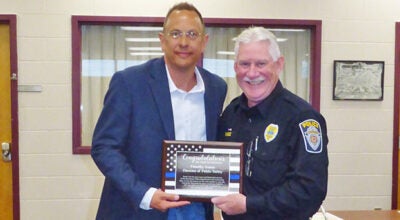Cass County law enforcement committee meets to begin developing strategic plan
Published 2:47 pm Wednesday, March 13, 2024
|
Getting your Trinity Audio player ready...
|
CASSOPOLIS — The newly formed Cass County Law Enforcement Strategic Planning Committee decided Tuesday to change the focus of a committee formed during a special meeting in February. Instead of focusing on developing a new millage to support county law enforcement, members agreed they favor asking voters to renew the existing Cass County Drug Enforcement Taskforce millage.
The committee, which held its first meeting Tuesday and is made up of commissioners, county officials, law enforcement professionals and local government leaders, also decided to change their name and add two citizen members. The new name is the Law Enforcement Strategic Planning Committee. The committee will meet again next Tuesday at 2 p.m. at the Cass County Administration Building.
The two citizens joining the committee are Roger Boyer and Lynn Schantz. Both spoke at the start of the meeting about the need for citizen input on the committee, with Boyer saying he had volunteered for it but had never been contacted. Schantz said the committee needed citizens who will “look at both sides and fight for both sides.”
“Asking the public for more tax money when they’re already overburdened is a very, very serious matter,” Boyer said. “I believe 100 percent in law enforcement. We need it and we need it more than ever. … But before you as a committee ask for a millage from we the people, we the bosses, we need to have a full and complete audit of all the monies for both departments.”
“We are your bosses. You have to listen to us,” Schantz said. “You have to listen to all of us plus all the seniors. The seniors are hurting too. A lot of seniors cannot afford a new millage.”
County Clerk/Register Monica McMichael called for transparency about where current tax dollars are going in a time when many people distrust the government. She added that she and local clerks had heard an earful about taxes from people voting in the recent Feb. 27 election.
Their concerns as well as the general concern about why people are leaving the county by former County Commissioner Skip Dyes appeared to be heard by committee members.
Cass County Sheriff Richard Behnke was the first committee member to speak. He said he had also heard from people concerned about paying more taxes and also wondering how the drug enforcement taskforce money is being spent.
Behnke also questioned the name of the committee and didn’t think it should contain the word “millage.”
“I feel (going for a new millage) is a little premature,” he said. “We should have been out talking to the community first before we brought up the idea of a millage, but here we are today.”
He said he felt it was imperative to have the existing drug enforcement taskforce millage be renewed. It supplies funding to support drug enforcement, criminal justice and public safety efforts in the county.
That millage was first put in place in 2004 and currently allows for a levy of up to .4805 mills. He said the taskforce has played an important role in solving major crimes in the county.
“To just throw it away is unacceptable,” he said.
He and Cass County Prosecutor Victor Fitz have both spoken in recent weeks about their need for more staff. The sheriff’s department has several vacancies as does the prosecutor’s office and both blamed the situation on them not being able to offer more competitive compensation packages to new hires.
Fitz agreed Tuesday that the existing millage must be on the ballot but continued to call for more funding for both departments to hire more staff.
Both he and Behnke said they had turned back hundreds of thousands of general fund dollars not spent to the county and they said looking at the existing surplus funds should be a first step.
Fitz saw three important goals for the committee: recommending the millage renewal, formulating a plan to solve the staffing crisis including using surplus funds, and exploring putting a law enforcement millage before voters in 2025 to address county public safety and law enforcement needs.
Relative to funding available now, committee members noted that the sheriff’s department returned $317,000 to the county last year, while the prosecutor’s office returned $175,000. In addition, members said the general fund has a $8 million fund balance and the drug enforcement taskforce has around a $3 million fund balance.
Committee members said they will be going over more details and data about the current situation including possible available funding at next week’s meeting.
“Let’s get what the problem is in front of us and work back to possible solutions,” County Commissioner Ryan Laylin said. “We need to do that instead of throwing money at it and see if it solves the problem. We all know that money doesn’t solve problems.”







